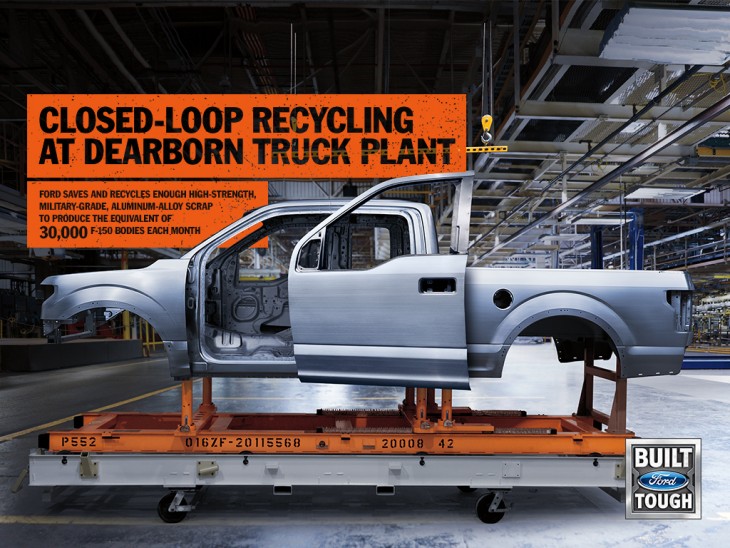The new F-150 is the greenest F-150 thanks to advanced materials like high-strength, military-grade aluminum alloy and EcoBoost® engine technology. Ford recycles as much as 20 million pounds of aluminum stamping scrap per month, using the closed-loop system at its Dearborn Truck Plant where the F-150 is built. That is the equivalent of more than 30,000 F-150 bodies in the largest configuration (a SuperCrew body, including doors, plus hood, tailgate and 6.5-foot cargo box).
Opting for aluminum over steel in new automobile construction is the best way to reduce energy consumption and carbon emissions, according to Oak Ridge National Lab. Recycled aluminum avoids 95% of the greenhouse gas emissions associated with primary aluminum production. It also uses significantly less energy and water – another reason Ford F-150 leads the full-size truck pack in terms of lifetime carbon footprint, according to Automotive Science Group.
Weight savings from aluminum alloy helps F-150 reduce its lifetime emissions compared to the previous steel-body version. Between 30 and 40% of a typical aluminum coil is turned into scrap in the stamping process. This is recycled into new metal for the truck using the closed-loop system with suppliers like Novelis and Alcoa.
The lighter weight of the vehicle also contributes to improved fuel savings. When equipped with the available 2.7-liter EcoBoost engine with standard Auto Start-Stop technology, the F-150 4×2 has best-in-class EPA-estimated gasoline fuel economy ratings of 19 mpg city, 26 mpg highway and 22 mpg combined (actual mileage will vary).
The new aluminum-bodied F-150 SuperCrew and SuperCab with available collision warning are the only trucks in their class to earn a Top Safety Pick from Insurance Institute for Highway Safety. F-150 also is the only full-size, light-duty truck to earn National Highway Traffic Safety Administration’s highest rating, a five-star overall vehicle score and five-star rating for driver and passenger for all crash test modes and cab configurations – SuperCrew, SuperCab, and Regular Cab.
Check out Ford’s Instagram to see the closed-loop recycling process in action.
A video posted by Ford Motor Company (@ford) on

